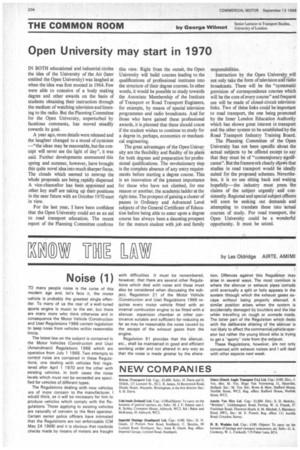Open University may start in 1970
Page 206

If you've noticed an error in this article please click here to report it so we can fix it.
by George Wilmot University of London.
IN BOTH educational and industrial circles the idea of the University of the Air (later entitled the Open University) was laughed at when the idea was first mooted in 1964. Few were able to conceive of a body making degree and other awards on the basis of students obtaining their instruction through the medium of watching television and listening to the radio. But the Planning Committee for the Open University, unperturbed by facetious comments, has moved steadily towards its goal.
A year ago, more details were released and the laughter changed to a mood of cynicism —"the ideas may be reasonable, but the concept will never see the light of day", it was said. Further developments announced this spring and summer, however, have brought this quite novel idea into much sharper focus. The clouds which seemed to enwrap the whole proposals are being rapidly dispersed A vice-chancellor has been appointed and other key staff are taking up their positions in the near future with an October 1970 start in view.
For the last year, I have been confident that the Open University could act as an aid to road transport education. The recent report of the Planning Committee confirms this view. Right from the outset, the Open University will build courses leading to the qualifications of professional institutes into the structure of their degree courses. In other words, it would be possible to study towards the Associate Membership of the Institute of Transport or Road Transport Engineers, for example, by means of special television programmes and radio broadcasts. And for those who have gained these professional awards, it is planned that these should count if the student wishes to continue to study for a degree in, perhaps, economics or mechanical engineering.
The great advantages of the Open University are the flexibility and fluidity of its plans for both degrees and preparation for professional qualifications. The revolutionary step is the complete absence of any entry requirements before starting a degree course. This is an innovation of the greatest importance for those who have not climbed, for one reason or another, the academic ladder at the right time. The prospect of gaining a cluster of passes in Ordinary and Advanced Level subjects of the General Certificate of Education before being able to enter upon a degree course has always been a daunting prospect for the mature student with job and family responsibilities.
Instruction by the Open University will not only take the form of television and radio broadcasts. There will be the "systematic provision of correspondence courses which will be the core of every course" and frequent use will be made of closed-circuit television links. Two of these links could be important to road transport, the one being promoted by the Inner London Education Authority which has shown great interest in transport and the other system to be established by the Road Transport Industry Training Board.
The Planning Committee of the Open University has not been specific about the actual subjects to be offered except to say that they must be of "contemporary significance". But the framework clearly shows that studies in road transport would be ideally suited for the proposed schemes. Nevertheless, it is no use sitting back and waiting hopefully the industry must press the claims of the subject urgently and consistently. Regional and special subject officers will soon be seeking out demands and attempting to translate these into actual courses of study. For road transport, the Open University could be a wonderful opportunity. It must be seized.




































































































































































































































































